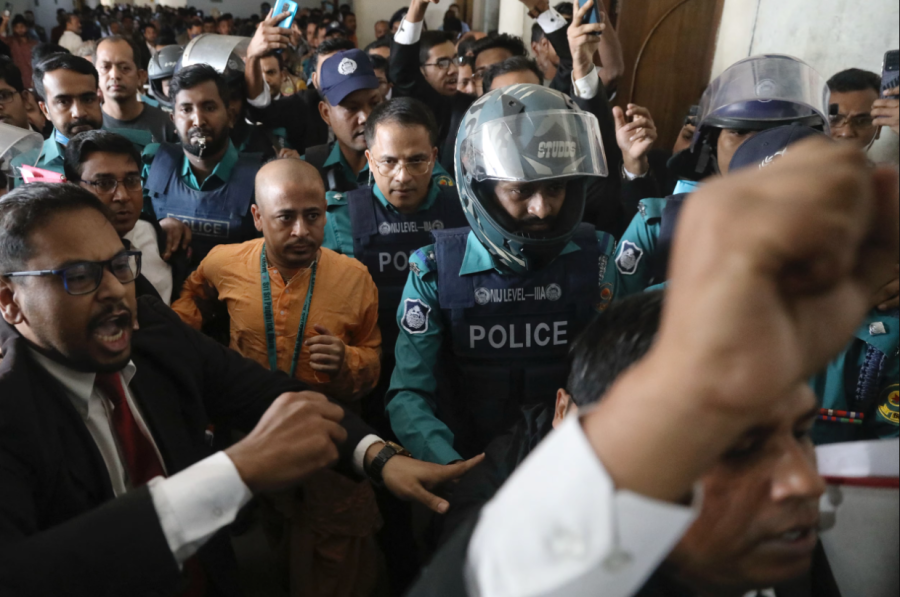Columns
Hard times in India-Bangladesh ties
Bangladesh and India must work cautiously to put their relationship back on track.
Smruti S Pattanaik
Hindu monk Chinmoy Krishna Das, a former member of the International Society for Krishna Consciousness (ISKCON) and now a spokesperson of Bangladesh Sammilita Sanatani Jagran Jote, was arrested on charges of treason upon his arrival at the Shahjalal International Airport in Dhaka. This has spiralled into a war of words, threatening to damage the existing bilateral relations between India and Bangladesh.
Das was brought to a magistrate court in Chittagong on November 26 and was denied bail. A protest against the decision led to a violent clash between Das’s supporters and law enforcing authorities, where a lawyer named Saiful Islam was hacked to death, ensuing a blame game between the Monk’s supporters and his political opponents.
Aftermath of arrest
In a statement by India’s Ministry of External Affairs (MEA) on November 26, India expressed “deep concern”. It asked the interim regime to “ensure the safety and security of Hindus and all minorities.” However, Bangladesh dismissed India’s concerns, and the country’s foreign ministry referred to India’s statement as “unfounded” and “misrepresented fact”, which stands “contrary to the spirit of friendship and understanding between the two neighbouring countries”. Since then, social media has been rife with nationalistic rhetoric of netizens against one other.
Meanwhile, the flags of both countries were desecrated by protestors as if to score a nationalistic point over the other. However, the situation did not end there. As groups within India, supported by regional political leaders, gained ground, the Bangladesh Assistant High Commission office in Agartala was attacked. India issued a statement, describing the attack as “deeply regrettable” and promising action against those breaching the mission’s security.
The bank accounts of Das and 17 members of ISKCON have been frozen. Bangladesh’s immigration police didn’t permit 54 group members from ISKCON to cross over to India despite having valid travel documents. There are demands in Bangladesh that ISKCON be declared a terrorist organisation. However, the Bangladesh High Court dismissed an appeal to ban the organisation.
Issue of minority safety
After the fall of the regime, houses and properties of the minority community were targeted. According to reports, 1,068 homes and business establishments were attacked. There were reports about attacks on temples across the country. A gold-plated silver crown gifted by Prime Minister Narendra Modi to the Jeshoreshwari Kali temple in Bangladesh’s Satkhira district was stolen. India expressed its concerns, and Modi spoke to the interim regime's Chief Adviser, Muhammad Yunus. Yunus visited Dhakeswari temple, assured the minority community of safety, and promised to take action against those who attacked them. But the violence continued. Some Hindus said they took help from their Muslim neighbours to protect themselves. In some cases, people kept vigil to protect temples.
Some Bangladeshi politicians justify the event as an attack on “Awami-Hindus” as if they deserved it since they are perceived as supporters of the deposed regime. In 2001, Bangladesh witnessed similar violence by the Bangladesh Nationalist Party (BNP) supporters when the Awami League lost power to the BNP. Durga puja was celebrated in a lacklustre manner, and 35 puja pandals were attacked. In one of the places, Islamic music was played.
As a result, many Hindus wanted to flee to India but were not allowed to cross the border. Such attacks on minorities also occurred during the Awami League period, but the scale of violence this time was massive. While Bangladesh media accused Indian media of “exaggerating”, it was silent on the magnitude of these attacks except for The Daily Star and Prothom Alo, whom the Islamists targeted for their reportage on the attack on minorities.
Fallout of the Monk’s arrest
Several hospitals in Tripura and West Bengal announced they won’t admit patients from Bangladesh. There were protests in Bangladesh against the attack on the Bangladesh Assistant High Commission in Tripura, so the country decided to close the Commission temporarily. Both countries have stepped up the security of their missions following the security breach in Agartala. Emotions are running high among the people on both sides. Statements by politicians have further fuelled the acrimony.
The current relationship is vulnerable to domestic politics on both sides. Since the fall of the Hasina government, anti-Indianism has been influenced by vested interests in Bangladesh, seeking to recast its foreign relations while portraying India as a beneficiary of Hasina’s rule. Despite all these upheavals marked by high expectations, frustration and accusations, India has not accepted the change of regime in Dhaka.
There is a new emphasis on the relationship with Pakistan as the interim government announced a re-examination of MoUs and agreements concluded with India. Revival of the SAARC has been proposed, while the Bay of Bengal Initiative for Multi-Sectoral Technical and Economic Cooperation (BIMSTEC) has disappeared from the political lexicon.
Border trade continues as usual, and there is a ray of hope in bilateral relations. The Home Minister of India inaugurated a passenger terminal building on October 27. Ten Bangladesh officers also came to India for Land Port Training under India’s Indian Technical and Economic Cooperation Programme (ITEC) in October. When protestors from India threatened to disrupt trade following Das’s arrest, the Border Security Force and the Land Port Authority of India took measures by shutting the access to the border entry points. A meeting at the Foreign Secretary level is due next week.
Bilateral relations are not founded on century-old socio-economic relations but on the reality of geography. Bangladesh remains India’s largest trading partner in South Asia, and India is Bangladesh’s second-largest trading partner after China. The two countries mostly trade essential food items. Moreover, India exports raw materials for Bangladesh’s garment industry, contributing 80 percent of the export earnings, which add up to 11 percent to the country’s GDP.
Bangladesh and India must put the relationship back on track and take it forward. Irresponsible comments in the media create an atmosphere of a zero-sum game. This multifaceted relationship cannot be held hostage to any single issue, as India has underlined. It is time to take extreme caution to navigate this complex bilateral relationship as Bangladesh moves towards implementing institutional reforms that would ultimately pave the way for democracy, as aspired by the July uprising that unseated Hasina.




 14.24°C Kathmandu
14.24°C Kathmandu















